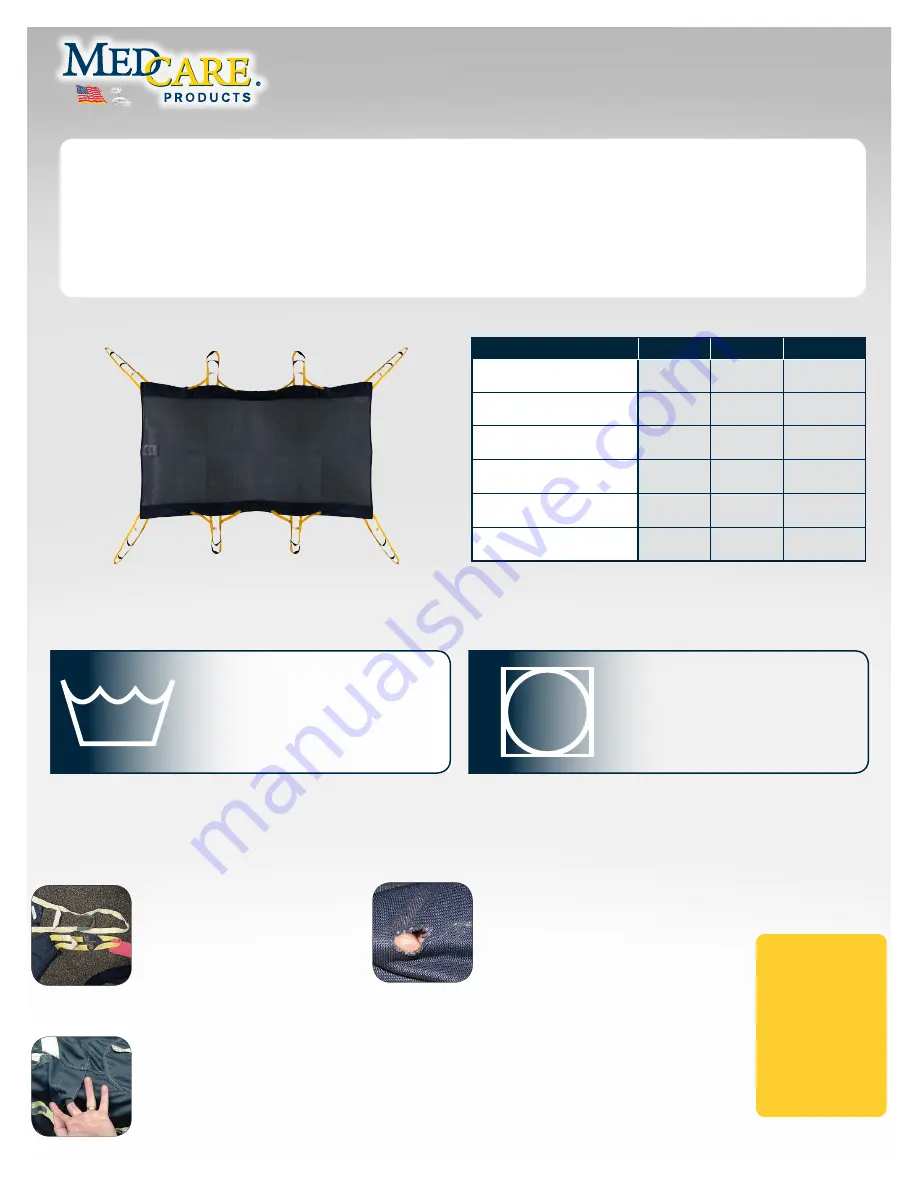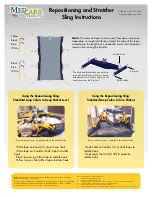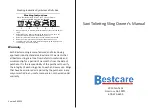
Toll Free: 1-866-891-6502
www.handicareusa.com
Repositioning and Stretcher
Sling Instructions
The
Repositioning and Stretcher Sling
family has been
designed to be left under the patient. These slings assist
with repositioning, turning, and lateral transfers from bed
to gurney or operating table.
Features:
• 1,000 lbs weight capacity
• Made from rip stop polyester — if punctured or torn, it will not rip
• 8-point hook up — attaches to any 2 or 4-point hook and loop
sling attachment system
• Antimicrobial Protection — inhibits growth of microbes such as
bacteria, mold and mildew that can cause stains, odors, and
product deterioration (Excludes disposables)
Photo of Stretcher Repositioning Sling
(Part Number 402508)
Sling Par
t Numbers:
Sling Type
Polyester
Mesh
Disposable
Stretcher Sling
80.5” L x 47.5” W
402450
NA
600200
Repositioning Sling
80.5” L x 55.5” W
NA
402500
600210
Bariatric Sling
88” L x 70” W
402503
NA
NA
Stretcher Repostioning Sling
84” L x 46” W
NA
402508
NA
Autopsy Sling
80” L x 24” W
402506
NA
NA
Torso Sling
52” L x 24” W
402507
NA
NA
*Sizing chart is only a guide. Different patient body types including height and width
can affect the fit of the sling. Caregiver must determine correct size for patients.
*Proper patient and risk assessment is always required when deciding which sling type and application is to be
used. Always refer to your institutional policies and procedures to ensure appropriate techniques are being used.
Washing Instructions:
• Machine wash in soap solution
• Max washing temperature: 165° F
• Rinse thoroughly
• Do not bleach
• Do not dry clean
Drying Instructions:
• Hang or tumble dry
• Max drying temperature: 175° F
• Do not overload dryer
• Do not place with direct heat
source in dryer
*
WIPING:
Between uses, Accel® TB or similar products can be used to clean this product. Follow the
manufacturer’s guidelines when cleaning. When soiled, please follow the washing instructions.
*Disposable slings are designed such that laundry is not required nor allowed. Therefore, the sling should
be disposed of any time there is visible soiling of the sling and replaced with a new disposable sling.
Sling Inspection:
Use of Bleach
The use of bleach for cleaning any
Medcare manufactured sling is not
encouraged. Using bleach will reduce
the “life” of the sling. Bleach is known
to speed up fabric deterioration while
causing fading and discoloration. If your
facility is using bleach to launder slings it is
imperative to inspect for premature wearing
on a regular basis. This will ensure a safe
transfer for the patient and caregiver.
Loose Stitching
Any loose stitching on the sling, even if it is
only supportive stitching, weakens that area
and puts more strain on other areas of the
sling.
Fraying
Any fraying of the material on the sling or belt is
a clear indication that the fabric is in a weakened
condition. Slings and belts with fraying should be
removed from service immediately.
Rips or Burns in Material
Tears in fabric can spread and cause excess strain to
be put on other areas of the sling. Slings and belts
with rips, tears or burns should be removed from
service immediately.
Time or Duration of Use
The longevity of a Medcare sling is determined by
frequency of use and washes, washing and drying
temperatures, detergent/disinfectants, patient
weight, and incontinence. Average life expectancy
of a sling ranges from 6 months to 3 years and is
impacted by many variables.
Items which impact
integrity of slings:
• Frequency of use
• Frequency of washes
between use
• Washing temperature
• Drying temperature
• Detergents and
disinfectants
• Amount of weight lifted
• Patient incontinence
• Age of sling




